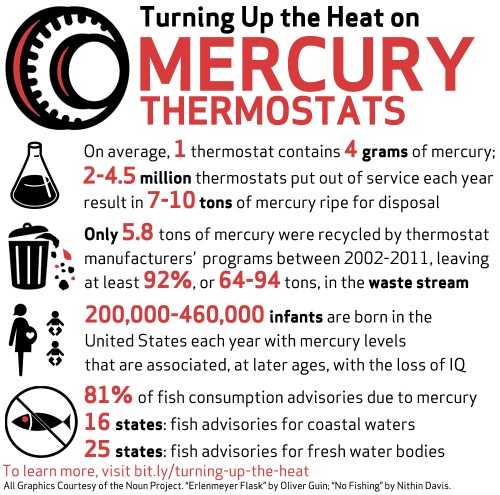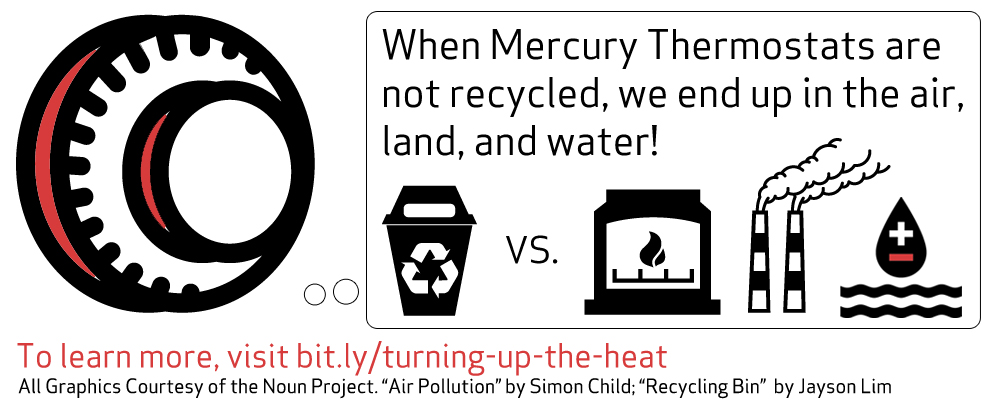Vermont leads nation in collecting discarded mercury thermostats
Manufacturer-led recycling programs found to be ineffective in most other states
Montpelier, VT – While a manufacturer-run program for collecting mercury thermostats is failing to keep the toxic heavy metal out of the trash—and the environment—in most states, Vermont leads the nation in per capita collection rates, according to a new report released today by the Mercury Policy Project and VPIRG. The report estimates that, at most, the industry recycling program has captured 8% of mercury thermostats coming out of service nationally in the past decade. This has resulted in the disposal of over 50 tons of mercury into the environment, which can expose people to the neurotoxin through fish consumption.
Of the 10 states with laws requiring mercury thermostat collection, only two—Maine and Vermont—had programs that were significantly more effective than states with no program at all. The Maine and Vermont programs require that manufacturers pay $5 to contractors and homeowners who return mercury-added thermostats, resulting in significantly higher collection rates.
Vermont’s mercury thermostat bounty program commenced on April 1, 2009, with 53 participating plumbing and heating wholesalers, 74 hardware stores, and 19 municipal solid waste district collection locations. After Vermont’s bounty went into effect, collections skyrocketed, and the state rose to first in the nation for collection in 2011.
“It’s clear that a financial incentive, coupled with good education and outreach, has resulted in Vermont having one of the highest per capita thermostat collection rates in the country,” said Michael Bender, director of the Mercury Policy Project. “A lot of credit for this goes to DEC staff outreach efforts.”
DEC staff have visited nearly every wholesaler collection location and retailer collection location at least three times since 2009 to assure that the program is being properly implemented and advertised. DEC continues to find program improvements at most sites, but has still found some not fully implementing it (missing signs, missing bins, or store clerks unfamiliar with the coupon program).
“It’s exciting to see that our mercury thermostat recycling program is among the best in the country, which is cutting down the amount of dangerous mercury in our environment and bodies. From mercury-containing thermostats to electronic waste to our bottle bill, these model Product Stewardship programs protect the environment and public health and should be expanded to other states and other products,” added Lauren Hierl, environmental health advocate at the Vermont Public Interest Research Group.
Mercury containing thermostats are a significant source of preventable mercury pollution. The U.S. Environmental Protection Agency (EPA) has conservatively estimated that 2 to 3 million thermostats come out of service each year nationally, amounting to 7 to 10 tons of mercury annually. Each thermostat contains an average of 4 grams of mercury.
Turning up the Heat II used data from the annual report of the Thermostat Recycling Corporation (TRC), a voluntary program created by manufacturers, to estimate the thermostat collection rates per capita for each state in 2009 through 2011. Results showed that TRC collected only 5.8 to 8 percent of the mercury thermostats coming out of service from 2002 to 2011.
Thermostat manufacturers routinely spin the data to highlight increases in thermostat collection while obscuring the fact that very few thermostats were still collected. For example:
- Georgia is ranked first, according to the TRC’s calculations, with a 3,522 percent improvement. However, the state still collected only an estimated 1,655 thermostats in 2011, leaving it near the bottom in terms of per capita collection rates.
- TRC describes the Texas program as a huge success story because it collected over 400% more in 2011 than 2009. However, the Texas program still collected less than 5,000 thermostats in 2011 compared to the Maine program, which collected 6,600 in the same year with a population 20 times smaller.
In 2010, MMPC released the first edition of Turning up the Heat, which evaluated 2008 collection data and found dismal collection rates. Turning Up the Heat II shows that little improvement has been made in the three years since, resulting in tons of mercury pollution in the nation’s water bodies.
In many states, legislation has been introduced in recent years that would require that thermostat manufacturers provide a financial incentive for the return of a thermostat. However, the outcomes have varied. In some states, such as Massachusetts, Connecticut, and Texas, manufacturers have countered by aggressively promoting bills that would do little more than require a continuation of the weak TRC program.
Background
Over the last sixteen years, mercury use in U.S. thermostat manufacturing has reduced from between approximately 15 and 21 tons annually to less than 1 ton per year. This dramatic drop can be attributed, in large part, to the passage of legislation in Vermont and 14 states banning the sale of new mercury thermostats. In the face of shrinking market availability for their mercury products, Honeywell announced in 2006 that it would end production of mercury thermostat switches, and the other large manufacturers have followed suit.
However, taking mercury thermostats off the market is only part of the solution. Tens of millions of mercury thermostats containing several hundred tons of mercury are still in use in U.S. homes and businesses. The mercury in a thermostat will pollute the air, land, or water if not managed properly at the end of its useful life. Given that thermostats can last for decades, the vast reservoir of mercury currently on walls in U.S. homes will be making its way into landfills and incinerators for years to come—unless effective collection programs are put in place.
The U.S. Centers for Disease Control and Prevention estimates that between 200,000 and 460,000 infants are born in the U.S. each year with mercury levels that are associated with the loss of IQ. This is due primarily to maternal consumption of mercury contaminated fish. Twenty-seven states have statewide advisories for all of their fresh water lakes and rivers, and 13 states have statewide advisories for all of their coastal waters, due to mercury pollution.
##
The report is available here.

